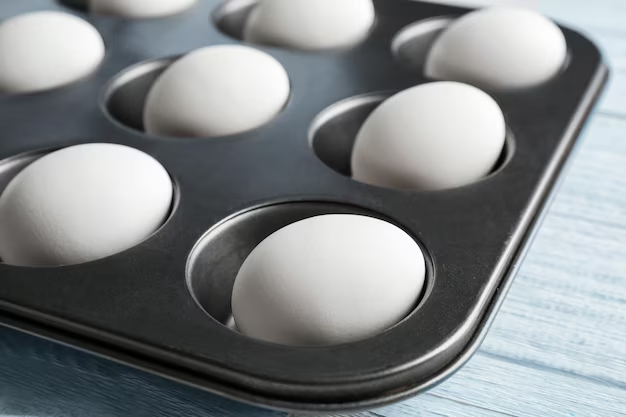How Long Do Hard Boiled Eggs Stay Fresh in the Refrigerator?
Cracking open a perfectly cooked hard boiled egg is one of life's simple pleasures, whether you're enjoying it as part of a breakfast, salad, or a quick protein-packed snack. But once boiled, how long are these little powerhouses good for when stored in the refrigerator? Understanding the best ways to store and maximize the shelf life of hard boiled eggs can prevent food waste and ensure you always have a delicious and safe egg ready to eat.
The Basics of Hard Boiled Egg Storage
Why Refrigeration Matters 🥚
Refrigeration plays a crucial role in extending the shelf life of foods, and hard boiled eggs are no exception. Once an egg is boiled, the protective coating of the shell is washed away, leaving its contents susceptible to bacteria if not stored properly. Keeping boiled eggs refrigerated minimizes the risk of spoilage and foodborne illnesses, while also preserving flavor and texture.
Optimal Storage Duration
In general, hard boiled eggs should be consumed within one week after boiling when stored in the refrigerator. This timeline ensures the eggs maintain optimal freshness and safety for consumption. Eating them beyond this period can increase the risk of encountering an off flavor or unappealing texture.
How to Store Hard Boiled Eggs in the Refrigerator
Intact or Peeled?
Whether you choose to store your eggs with the shell on or peeled can affect their shelf life:
- With Shell: Keeping the shell intact provides an additional layer of protection, helping the egg retain moisture and remain fresher for a slightly extended period.
- Peeled: If you've already cracked open your hard boiled eggs, ensure they are stored in an airtight container to prevent drying out or absorbing unwanted odors from other foods in your refrigerator.
Ideal Storage Practices
To make the most of your hard boiled eggs:
- Use a clean, sealed container for storing in the refrigerator.
- Label the container with the date of boiling to keep track of freshness.
- Store the eggs on a shelf within the fridge rather than the refrigerator door. This keeps them at a consistent, cooler temperature.
Avoid Freezing
While it's possible to freeze hard boiled eggs, the results can be less than satisfactory. Freezing can cause the egg whites to become tough and rubbery, altering the taste and texture significantly. If the need arises, only consider freezing the yolks, not the entire egg.
Recognizing When a Hard Boiled Egg Has Gone Bad
It’s important to identify the signs that a hard boiled egg may no longer be safe to eat. Here are some visual and sensory clues to keep in mind:
- Smell: A sulfurous or rotten odor is a clear indicator that an egg has spoiled.
- Appearance: Discoloration or mold on the shell or egg whites, and a greenish ring around the yolk, may suggest spoilage.
- Texture: A chalky or overly firm texture could signal the egg is past its prime.
The Consequences of Eating a Spoiled Egg
Consuming a spoiled egg can lead to unpleasant digestive symptoms, such as stomach upset, cramping, or diarrhea. Therefore, it’s vital to err on the side of caution if an egg seems off in any way. The principle of "better safe than sorry" applies strongly here.
The Science Behind Egg Spoilage
The Role of pH and Time
Eggs have a natural pH balance that gradually changes after boiling, making them more alkaline. The alteration is part of what leads to changes in texture and flavor if stored for too long.
The Effect of Temperature
Room temperature presents a thriving environment for bacteria growth, which is why refrigeration is essential. Keeping boiled eggs in a consistently cool temperature significantly reduces the bacteria growth rate.
Extending the Shelf Life of Hard Boiled Eggs
Practical Tips
To extend the freshness of your hard boiled eggs:
- Use promptly purchased, fresh eggs for boiling.
- Allow eggs to cool at room temperature before placing them promptly in the fridge.
- Consider an ice water bath post-cooking to stop the cooking process and cool the eggs quickly.
Embrace the Pickling Process 🥒
For those who want to push the boundaries, pickling offers a flavor-packed storage alternative. Pickling hard boiled eggs in a brine solution can preserve them for several weeks. This method not only provides an extended shelf life but also introduces a tangy taste twist.
Quick Takeaway Summary
Here’s a handy summary to keep your egg knowledge on point:
- Fridge Life: Up to 1 week 🗓️
- Storage Method: In-shell for added protection ✔️
- Signs of Spoilage: Off smell, discoloration, altered texture 🛑
- Avoid Freezing: Compromises texture and taste ❌
- Pickling Option: For longevity and flavor boost ✔️
Conclusion: Enjoying Your Hard Boiled Eggs Safely
Understanding the shelf life and proper storage of hard boiled eggs empowers you to enjoy them safely while minimizing waste. By following best practices, you can keep these versatile food items ready and delicious for all your meals and snacks, turning them into an enduring staple in your kitchen. So, next time you’re boiling a batch, remember these guidelines to savor your eggs while they’re fresh and flavorful.

